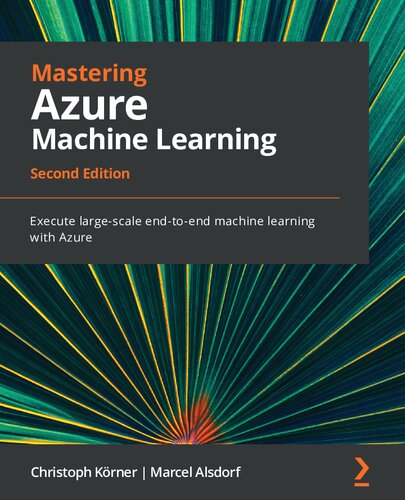

Most ebook files are in PDF format, so you can easily read them using various software such as Foxit Reader or directly on the Google Chrome browser.
Some ebook files are released by publishers in other formats such as .awz, .mobi, .epub, .fb2, etc. You may need to install specific software to read these formats on mobile/PC, such as Calibre.
Please read the tutorial at this link: https://ebookbell.com/faq
We offer FREE conversion to the popular formats you request; however, this may take some time. Therefore, right after payment, please email us, and we will try to provide the service as quickly as possible.
For some exceptional file formats or broken links (if any), please refrain from opening any disputes. Instead, email us first, and we will try to assist within a maximum of 6 hours.
EbookBell Team

4.1
30 reviewsSupercharge and automate your deployments to Azure Machine Learning clusters and Azure Kubernetes Service using Azure Machine Learning services
Key FeaturesAzure Machine Learning is a cloud service for accelerating and managing the machine learning (ML) project life cycle that ML professionals, data scientists, and engineers can use in their day-to-day workflows. This book covers the end-to-end ML process using Microsoft Azure Machine Learning, including data preparation, performing and logging ML training runs, designing training and deployment pipelines, and managing these pipelines via MLOps.
The first section shows you how to set up an Azure Machine Learning workspace; ingest and version datasets; as well as preprocess, label, and enrich these datasets for training. In the next two sections, you’ll discover how to enrich and train ML models for embedding, classification, and regression. You’ll explore advanced NLP techniques, traditional ML models such as boosted trees, modern deep neural networks, recommendation systems, reinforcement learning, and complex distributed ML training techniques – all using Azure Machine Learning.
The last section will teach you how to deploy the trained models as a batch pipeline or real-time scoring service using Docker, Azure Machine Learning clusters, Azure Kubernetes Services, and alternative deployment targets.
By the end of this book, you’ll be able to combine all the steps you’ve learned by building an MLOps pipeline.
What you will learnThis book is for machine learning engineers, data scientists, and machine learning developers who want to use the Microsoft Azure cloud to manage their datasets and machine learning experiments and build an enterprise-grade ML architecture using MLOps. This book will also help anyone interested in machine learning to explore important steps of the ML process and use Azure Machine Learning to support them, along with building powerful ML cloud applications. A basic understanding of Python and knowledge of machine learning are recommended.